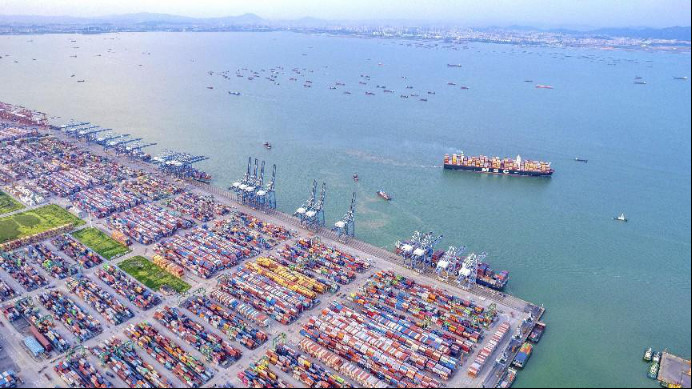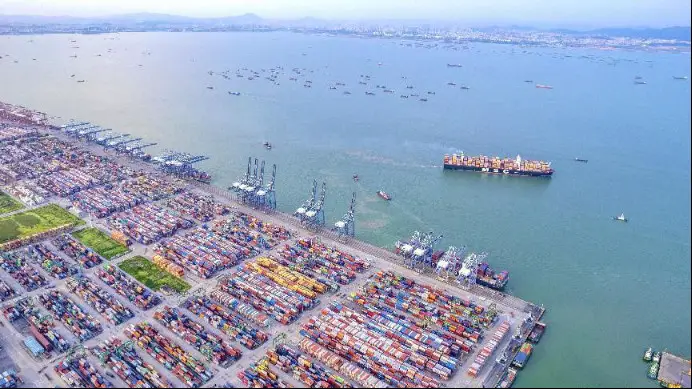By Gong Ming, Zhang Penghui, Jiang Xiaodan, Luo Aihua, People's Daily

Containers are lifted by cranes at the Nansha Port in Guangzhou, south China's Guangdong province. (Photo by Lyu Huadang/People's Daily Online)
The 2023 Understanding China Conference (Guangzhou) was held in Guangzhou, south China's Guangdong province from Dec. 1 to 3.
The conference, themed "China's New Endeavors amid Unprecedented Global Changes - Expanding the Convergence of Interests and Building a Community of Shared Future," was joined by over 600 participants from over 30 countries and regions, who had discussions on how to resolve common problems and improve the well-being of humanity.
Today, confronted with a weak global recovery and escalating geopolitical conflicts, humanity has once again come to a crossroads in history. "What kind of world we need and how to build such a world" has become a vital question with the future of humanity at stake.
At the 2023 Understanding China Conference (Guangzhou), China's new endeavors amid unprecedented global changes received huge attention, and the concept of building a community with a shared future for mankind has gathered a broad consensus.
Former Ethiopian President Mulatu Teshome said that countries are interdependent in the world today, and mankind is a community with a shared future. China hastaken the building of a community with a shared future for mankind as its responsibility, constantly providing the world with new opportunities through its own new development.
From deepening economic and trade cooperation and sharing development opportunities, to promoting green development and addressing climate change, Africa-China cooperation mirrors the goal of building a high-level Africa-China community with a shared future, he said.
Former Chancellor of Austria Wolfgang Schussel said that solving global issues such as climate change and regional conflicts needs common efforts from the international community. China is the second-largest economy in the world and has made indispensable contributions to world peace, stability, development and prosperity.
Building a community with a shared future for mankind requires countries to support economic globalization and free trade, safeguard multilateralism, keep open cooperation and promote equality and justice, he added.
As an important practice in building a community with a shared future for mankind, the Belt and Road Initiative (BRI) was a focus of discussion at the conference.
Mushahid Hussain Syed, head of Pakistan's Friends of Silk Road Club and chairman of the Pakistan-China Institute, noted that the vision of building a community with a shared future for mankind represents a new worldview, which explains that mankind is a community with a shared future and countries must respect with each other and reinforce cooperation.
During the past decade since the BRI was proposed, the initiative has brought new development opportunities to Asia, Africa, Latin America, Europe and other regions, and built new platforms for strengthening global economic cooperation.
Following the principle of extensive consultation, joint contribution and shared benefits, we'll build a world that's more open, inclusive and interconnected, he added.
At the conference, participants had in-depth discussions on higher-level opening up and economic globalization, artificial intelligence and the future of humanity, the development of the digital economy and cybersecurity governance.
It was widely recognized that China's commitment to promoting high-quality development with high-level opening up and the steady progress of Chinese modernization have injected positive energy into achieving common development through open cooperation.
The world is facing numerous challenges, and deepening cooperation between Europe and Asia is more important than ever before, said Deputy Governor of the National Bank of Hungary Barnabas Virag.
Virag remarked that China possesses many key technologies for sustainable development, such as clean energy, new energy vehicles, and biotechnology. Strengthening cooperation between European countries and China in areas including trade, climate change response, and sustainable development will benefit both sides, and will also help steer the international order towards a more just and reasonable direction.
Former Egyptian Prime Minister Essam Sharaf said that China's adherence to innovative development, which resulted in the rapid growth of information technology, big data, artificial intelligence, the Internet of Things, aerospace technologies and more, sets an example for other developing countries.
The China-proposed BRI promotes connectivity and trade development, creates opportunities for international cooperation, and assists developing countries to achieve modernization, Sharaf added.
Zafar Uddin Mahmood, former Special Assistant to the Pakistani Prime Minister and president of the Understanding China Forum, said that China has made tremendous progress in economic and social development under the leadership of the Communist Party of China.
Adhering to a people-centered development philosophy, China aims to ensure that the gains of development can better improve people's livelihood, which makes Chinese modernization an important example for other developing countries, Mahmood noted. As China shares its development dividends with the world, Chinese modernization will also benefit the people of other countries, he added.
The conference, themed "China's New Endeavors amid Unprecedented Global Changes - Expanding the Convergence of Interests and Building a Community of Shared Future," was joined by over 600 participants from over 30 countries and regions, who had discussions on how to resolve common problems and improve the well-being of humanity.
Today, confronted with a weak global recovery and escalating geopolitical conflicts, humanity has once again come to a crossroads in history. "What kind of world we need and how to build such a world" has become a vital question with the future of humanity at stake.
At the 2023 Understanding China Conference (Guangzhou), China's new endeavors amid unprecedented global changes received huge attention, and the concept of building a community with a shared future for mankind has gathered a broad consensus.
Former Ethiopian President Mulatu Teshome said that countries are interdependent in the world today, and mankind is a community with a shared future. China hastaken the building of a community with a shared future for mankind as its responsibility, constantly providing the world with new opportunities through its own new development.
From deepening economic and trade cooperation and sharing development opportunities, to promoting green development and addressing climate change, Africa-China cooperation mirrors the goal of building a high-level Africa-China community with a shared future, he said.
Former Chancellor of Austria Wolfgang Schussel said that solving global issues such as climate change and regional conflicts needs common efforts from the international community. China is the second-largest economy in the world and has made indispensable contributions to world peace, stability, development and prosperity.
Building a community with a shared future for mankind requires countries to support economic globalization and free trade, safeguard multilateralism, keep open cooperation and promote equality and justice, he added.
As an important practice in building a community with a shared future for mankind, the Belt and Road Initiative (BRI) was a focus of discussion at the conference.
Mushahid Hussain Syed, head of Pakistan's Friends of Silk Road Club and chairman of the Pakistan-China Institute, noted that the vision of building a community with a shared future for mankind represents a new worldview, which explains that mankind is a community with a shared future and countries must respect with each other and reinforce cooperation.
During the past decade since the BRI was proposed, the initiative has brought new development opportunities to Asia, Africa, Latin America, Europe and other regions, and built new platforms for strengthening global economic cooperation.
Following the principle of extensive consultation, joint contribution and shared benefits, we'll build a world that's more open, inclusive and interconnected, he added.
At the conference, participants had in-depth discussions on higher-level opening up and economic globalization, artificial intelligence and the future of humanity, the development of the digital economy and cybersecurity governance.
It was widely recognized that China's commitment to promoting high-quality development with high-level opening up and the steady progress of Chinese modernization have injected positive energy into achieving common development through open cooperation.
The world is facing numerous challenges, and deepening cooperation between Europe and Asia is more important than ever before, said Deputy Governor of the National Bank of Hungary Barnabas Virag.
Virag remarked that China possesses many key technologies for sustainable development, such as clean energy, new energy vehicles, and biotechnology. Strengthening cooperation between European countries and China in areas including trade, climate change response, and sustainable development will benefit both sides, and will also help steer the international order towards a more just and reasonable direction.
Former Egyptian Prime Minister Essam Sharaf said that China's adherence to innovative development, which resulted in the rapid growth of information technology, big data, artificial intelligence, the Internet of Things, aerospace technologies and more, sets an example for other developing countries.
The China-proposed BRI promotes connectivity and trade development, creates opportunities for international cooperation, and assists developing countries to achieve modernization, Sharaf added.
Zafar Uddin Mahmood, former Special Assistant to the Pakistani Prime Minister and president of the Understanding China Forum, said that China has made tremendous progress in economic and social development under the leadership of the Communist Party of China.
Adhering to a people-centered development philosophy, China aims to ensure that the gains of development can better improve people's livelihood, which makes Chinese modernization an important example for other developing countries, Mahmood noted. As China shares its development dividends with the world, Chinese modernization will also benefit the people of other countries, he added.
 Menu
Menu
 Expanding convergence of interests, building community of shared future
Expanding convergence of interests, building community of shared future
















